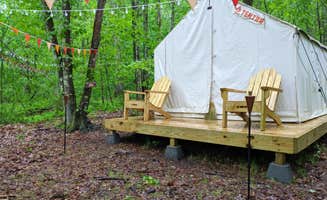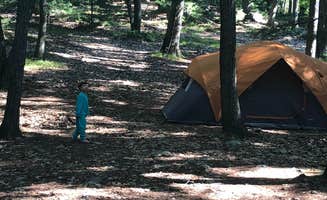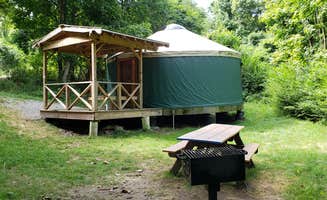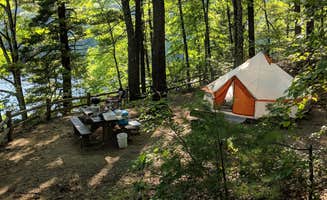Tent camping near Shrewsbury, Massachusetts offers diverse ecosystems from coastal islands to forest settings within a 50-mile radius. Summer temperatures typically range from 60-85°F with higher humidity near the coast, while spring and fall camping sees temperature swings from 40-70°F. Many campsites in this region require advanced planning with limited or no cell reception in several locations.
What to do
Paddle through Tully Lake: Tully Lake Recreation Area provides canoe and kayak rentals for water exploration. "We take our canoe and spend the whole day at the lake. You can find lots of private areas to swim, pick blueberries and relax," notes one visitor at Tully Lake Recreation Area.
Hike to scenic waterfalls: Trails around Tully Lake lead to impressive water features. "If you'd like to hike with children, there is an easy hike close to the entrance, along Doane's Falls, a series of 5 waterfalls along an ascending path through a wooded area," explains a camper.
Island hopping by ferry: Boston Harbor Islands allows exploration of multiple islands in a single trip. "During the day you can take small ferries to a variety of other islands to go swimming or explore. This is a great adventure for kids," says a reviewer at Boston Harbor Islands State Park.
Sunset watching: Soapstone Hill in Federated Women's Club State Forest offers sunset views over Quabbin Reservoir. "If you continue past site 15, you'll head through Gate 36 out toward Soapstone Hill which offers a great view of Quabbin Reservoir and sunsets," explains a visitor.
Beach activities: Some campgrounds provide access to swimming areas. "There's a small somewhat sandy area that perhaps used to be a beach of sorts, though no lifeguards or anything. The water is clean and fine for swimming with a few areas that make for easy entry into the water," reports a camper at Buck Hill Campground.
What campers like
Privacy between sites: Campers appreciate spacious sites that provide separation from neighbors. "We stayed at site 1, which was HUGE and extremely private. Sites closer to the water that we saw were less private, but still very peaceful and spread out," notes a visitor.
No-vehicle camping areas: The absence of cars creates a quieter experience. "No cars at all at the campsites, which was great for peace of mind as our toddler roamed around. It also made for a super quiet stay," reports a camper.
Unique camping structures: Some campgrounds offer alternatives to traditional tent camping. "The yurts on Peddocks are great, providing shelter from the elements, bunks with mattresses, electricity, a ceiling fan, table with benches, and a grill," shares a reviewer at Boston Harbor Islands State Park.
Rustic experiences close to urban areas: The region offers primitive camping not far from city conveniences. "All of this right in Saugus MA, less than 30 minutes from Boston," notes a camper at Camp Nihan Education Center. Another adds, "The group site is super close to parking and yet the terrain is rugged enough that it always felt like we were really in the woods."
Wild berry picking: Several campgrounds have seasonal wild berry opportunities. "In mid-August we collected handfuls of blackberries as we explored Peddocks."
What you should know
Advance reservations essential: The best tent camping near Shrewsbury books quickly. "These sites book quickly, so you should try to book 7 months to the day in advance. That said, you can also look for last minute openings."
Limited cell coverage: Many campgrounds have spotty or no service. "Cell phone coverage is faint to nonexistent on Verizon. You may want to download offline maps before you head out here," advises a camper at Federated Womens Club State Forest.
Walking distance to facilities: Some campgrounds have centralized amenities requiring walks. "From some of the sites, this will be a long walk during the night," notes a camper regarding bathroom facilities.
Transportation logistics: Island camping requires planning. "Getting to the island was a bit of a hassle. We live in Boston and took all of our gear on the T to the harbor by the aquarium. We then took the ferry to Georges Island. After that we waited and got on a much smaller island to Lovells."
Water access: Bring containers at sites without direct water access. "There is 1 or 2 places to grab water so make sure to bring refillable containers," advises a visitor at Barton Cove Campground.
Tips for camping with families
Pack light for walk-in sites: Bring only essentials for sites requiring hiking in. "Keep gear to a minimum is a good idea," suggests a Tully Lake camper, adding "though they provide carts the trails can make hauling them tough."
Choose sites with kid-friendly features: Some campgrounds offer extras for children. "Breakheart Reservation, which had a great shallow pond with life guard on duty as well as bike trails and a range of different hikes," reports a Camp Nihan visitor.
Consider no-vehicle campgrounds: Car-free camping areas provide safety benefits. "No cars at all at the campsites, which was great for peace of mind as our toddler roamed around."
Download maps before arrival: Limited cell service means preparation is key. "You may want to download offline maps before you head out here. If you're into geocaching, download those, too."
Check noise levels: Some campgrounds may have varied noise experiences. "We went memorial day weekend few years ago, busy holiday of young teens partying. Park staff tried their best, but other campers definitely took away from our stay."
Tips from RVers
Limited RV options: Most camping in the area is tent-focused with few RV amenities. Only Boston Harbor Islands shows electric and water hookups among reviewed campgrounds, but these may be for permanent structures.
Tent platforms for stability: Some campgrounds offer raised platforms. "Sites have tent platforms, grill, fire pit and picnic tables," notes a Barton Cove camper.
Consider high clearance vehicles: Some roads to campgrounds are rough. "It's possible to park at other sites; I'm guessing the gate at the beginning of the road toward the campground is open when the campground is open. If so, high clearance vehicle is definitely preferred."
Gate access protocols: Some campgrounds have security gates requiring specific procedures. "Only real annoyance was dealing with set up and take down of the campsite- you check in at the office, grab a key to unlock the gate, drive to the campground, unlock gate, drive through gate, lock gate, unload your stuff, drive to gate, unlock gate, drive through gate, lock gate, return key, drive back to campground, walk to your site."





